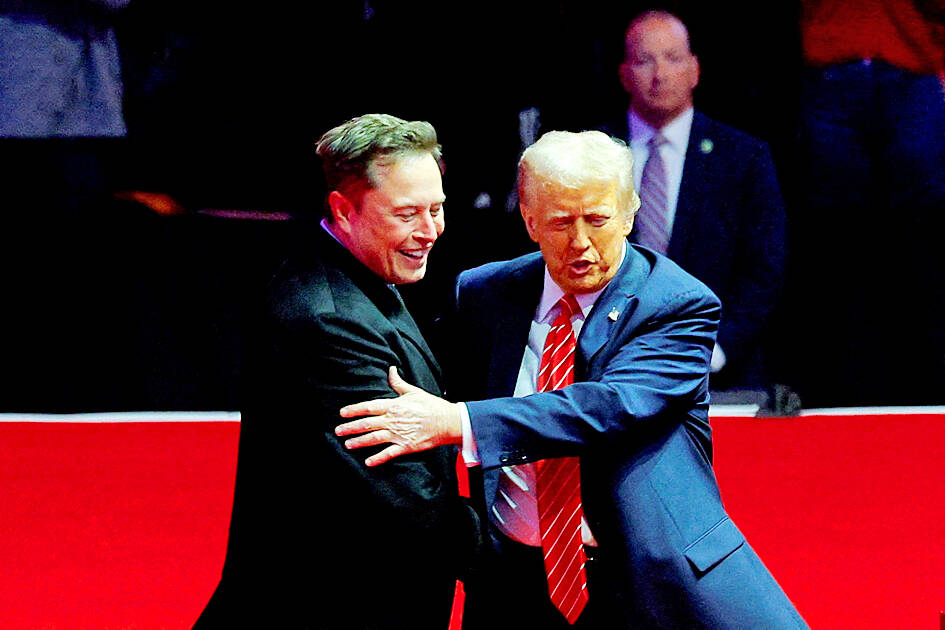Groups representing some of South Africa’s white minority on Saturday responded to a plan by US President Donald Trump to offer them refugee status and resettlement in the US by saying: Thanks, but no thanks.
The plan was detailed in an executive order Trump signed on Friday that stopped all aid and financial assistance to South Africa as punishment for what the Trump administration said were “rights violations” by the government against some of its white citizens.
The Trump administration accused the South African government of allowing violent attacks on white Afrikaner farmers and introducing a land expropriation law that enables it to “seize ethnic minority Afrikaners’ agricultural property without compensation.”

Photo: Reuters
The South African government has denied there are any concerted attacks on white farmers and has said that Trump’s description of the new land law is full of misinformation and distortions.
Whites make up about 7 percent of South Africa’s population of 62 million.
On Saturday, two of the most prominent groups representing Afrikaners said they would not be taking up Trump’s offer of resettlement in the US.
“Our members work here, and want to stay here, and they are going to stay here,” said Dirk Hermann, chief executive of the Afrikaner trade union Solidarity, which says it represents around 2 million people. “We are committed to build a future here. We are not going anywhere.”
At the same news conference, Kallie Kriel, the CEO of the Afrikaner lobby group AfriForum, also spoke out.
“We have to state categorically: We don’t want to move elsewhere,” he said.
Trump’s move to sanction South Africa, a key US trading partner in the region, came after he and his South African-born adviser Elon Musk have accused its black leadership of having an anti-white stance.
However, the portrayal of Afrikaners as a downtrodden group that needed to be saved would surprise most South Africans.
“It is ironic that the executive order makes provision for refugee status in the US for a group in South Africa that remains amongst the most economically privileged,” the South African Department of International Relations and Cooperation said.
It also criticized the Trump administration’s own policies, saying the focus on Afrikaners came “while vulnerable people in the US from other parts of the world are being deported and denied asylum despite real hardship.”
There was “a campaign of misinformation and propaganda” aimed at South Africa, the ministry said.
Despite being a small minority, whites own about 70 percent of South Africa’s private farmland. A study in 2021 by the South Africa Human Rights Commission said that 1 percent of whites were living in poverty compared with 64 percent of blacks.

Thousands gathered across New Zealand yesterday to celebrate the signing of the country’s founding document and some called for an end to government policies that critics say erode the rights promised to the indigenous Maori population. As the sun rose on the dawn service at Waitangi where the Treaty of Waitangi was first signed between the British Crown and Maori chiefs in 1840, some community leaders called on the government to honor promises made 185 years ago. The call was repeated at peaceful rallies that drew several hundred people later in the day. “This government is attacking tangata whenua [indigenous people] on all

RIGHTS FEARS: A protester said Beijing would use the embassy to catch and send Hong Kongers to China, while a lawmaker said Chinese agents had threatened Britons Hundreds of demonstrators on Saturday protested at a site earmarked for Beijing’s controversial new embassy in London over human rights and security concerns. The new embassy — if approved by the British government — would be the “biggest Chinese embassy in Europe,” one lawmaker said earlier. Protester Iona Boswell, a 40-year-old social worker, said there was “no need for a mega embassy here” and that she believed it would be used to facilitate the “harassment of dissidents.” China has for several years been trying to relocate its embassy, currently in the British capital’s upmarket Marylebone district, to the sprawling historic site in the

‘IMPOSSIBLE’: The authors of the study, which was published in an environment journal, said that the findings appeared grim, but that honesty is necessary for change Holding long-term global warming to 2°C — the fallback target of the Paris climate accord — is now “impossible,” according to a new analysis published by leading scientists. Led by renowned climatologist James Hansen, the paper appears in the journal Environment: Science and Policy for Sustainable Development and concludes that Earth’s climate is more sensitive to rising greenhouse gas emissions than previously thought. Compounding the crisis, Hansen and colleagues argued, is a recent decline in sunlight-blocking aerosol pollution from the shipping industry, which had been mitigating some of the warming. An ambitious climate change scenario outlined by the UN’s climate

BACK TO BATTLE: North Korean soldiers have returned to the front lines in Russia’s Kursk region after earlier reports that Moscow had withdrawn them following heavy losses Ukrainian President Volodymyr Zelenskiy on Friday pored over a once-classified map of vast deposits of rare earths and other critical minerals as part of a push to appeal to US President Donald Trump’s penchant for a deal. The US president, whose administration is pressing for a rapid end to Ukraine’s war with Russia, on Monday said he wanted Ukraine to supply the US with rare earths and other minerals in return for financially supporting its war effort. “If we are talking about a deal, then let’s do a deal, we are only for it,” Zelenskiy said, emphasizing Ukraine’s need for security guarantees